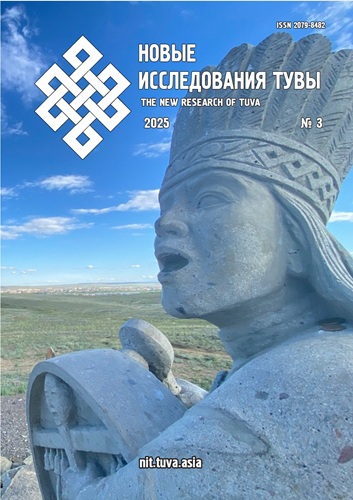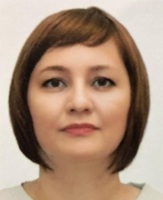Systems of Ichthyonyms in the Tatar and Tuvan Languages
DOI:
https://doi.org/10.25178/nit.2025.3.20Keywords:
Tatar language; Tuvan language; Turkic language; ichthyonym; zoonym; semantic development; generic componentAbstract
This article addresses, for the first time, the ichthyonyms of the Tatar and Tuvan languages from a comparative perspective. It has been established that the systems of ichthyonyms in the Tatar and Tuvan languages exhibit more distinctions than commonalities. Groups of names common to both Tatar and Tuvan languages (10 names) as well as language-specific names (with the greatest number of terms) have been identified. Six names, relating to the Proto-Turkic lexicon, are characterized by identical semantics or minor differences in meaning.
Proposed are schematic models of possible semantic development of individual words, demonstrating shifts in meaning from concrete to general or from general to concrete. The specific features of the ichthyonymic systems in the studied languages have formed under the influence of linguistic and extralinguistic factors, including the fish habitat area, the uniqueness of the worldviews of the peoples, and the peculiarities of language development. The Tuvan language is characterized by ichthyonyms as euphemisms, reflecting the special attitude of the people toward fish.
Generic components in the formation of ichthyonyms have been identified (two in Tatar, five in Tuvan), three of which are unique to Tuvan. A distinct group of specific terms consists of names for fish fry, which are represented in greater detail in Tuvan — primarily related to the more significant role of fish in the lives of Tuvan language speakers.
Both Tatar and Tuvan languages have developed age-based names for five fish species; among them, names for different age groups of ide (Leuciscus) are used in both languages. It is noted that commonality manifests within specificity: the identified model for forming some dialectal names for fish fry in the studied languages indicates similarity in nomination.
References
Byatikova, O. N. (2005) Lexicon of Fishing in the Tatar Literary Language. Kazan, s. n., 160 pp. (In Russ.)
Varpakhovsky, N.A. (1886) Essay on the Ichthyological Fauna of Kazan Governorate. St. Petersburg, Typ. Imp. Akad. Nauk. 71 p. (In Russ.)
Varpakhovsky, N. A. (1889) Brief Data on the Ichthyofauna of Asian Russia: Work by N. Varpakhovsky. St. Petersburg, Typ. Imp. Akad. Nauk. 21 p. (In Russ.)
Gavriliev, S. L. (2018) Comparative-historical analysis of criminal law terms in Yakut and Kyrgyz languages. In: Comparative-Contrastive Study of Turkic and Mongolic Languages: Materials of the International Scientific and Practical Conference, ed. by A.K. Prokopyeva. Yakutsk, Publishing House of NArFU. 608 p. Pp. 50–57. (In Russ.)
Darzha, V. K. (2009) Traditional Male Activities of the Tuvans. Vol. 1. Economy. Hunting. Fishing. Kyzyl, Tuvan Book Publishing House. 590 p. (In Russ.)
Ivanov, E. E. (2022) Absurd and paradoxical proverbs in the Tuvan language (ontological and logical aspects of categorization of proverbial semantics). Oriental Studies, vol. 15, no. 6, pp. 1373–1388. (In Russ.) DOI: https://doi.org/10.22162/2619-0990-2022-64-6-1374-1389
Ivanov, E. E. (2023) Linguocultural commentary in the Tuvan-Russian-English paremiological dictionary. New Research of Tuva, no. 1, pp. 243–258. (In Russ.) DOI: https://doi.org/10.25178/nit.2023.1.14
History of Zoological Studies at Kazan University: 19th — 20th Centuries (2003). Authors V. I. Garanin, V. A. Kuznetsov, Kh. M. Kurbangalieva and V. A. Yakovlev. Kazan, Kazan University Press. 85 p. (In Russ.)
Kuular, E. M. (2016) Ichthyonyms in the dialects of the Tuvan language: a comparative aspect. Filologicheskie Nauki. Voprosy Teorii i Praktiki, no. 8 (62), part 2, pp. 105–108. (In Russ.)
Kuular, E. M. (2018) Euphemisms in hunting and fishing vocabulary of the Tuvan language. Vestnik Khakasskogo Gosudarstvennogo Universiteta im. N. F. Katanova, no. 26, pp. 49–51. (In Russ.)
Lebedeva, E. A. (1986) Notes on the history of Chuvash fish names. In: Problems of Compiling an Etymological Dictionary of an Individual Language, ed. by M. I. Skvortsov. Cheboksary, Chuvash NIYALIÉ. 164 p. Pp. 152–158. (In Russ.)
Musaev, K. M. (1984) Lexicology of Turkic Languages. Moscow, Nauka. 228 p. (In Russ.)
Olmesov, R. N. (2004) Comparative-Historical Study of the Economic Vocabulary of the Kumyk Language: Names of Domestic Animals and Birds. Makhachkala, s. n. 200 p. (In Russ.)
Petrushevskaya, Yu. A. (2022) Tuvan and Belarusian proverbial parallels (typological commonality against the background of ethnocultural specificity). New Research of Tuva, no. 3, pp. 241–263. (In Russ.) DOI: https://doi.org/10.25178/nit.2022.3.16
Popov, V. A. and Lukin, A. V. (1971) Animal World of Tataria (Vertebrates). 2nd ed. Kazan, Tatar Book Publishing House. 263 p. (In Russ.)
Radlov, V. V. (1893) Attempt at a Dictionary of Turkic Dialects. St. Petersburg, Typ. Imp. Akad. Nauk. Vol. 1. Part 1. 967 p. (In Russ.)
Ramazanova, D. B. (2016) Materials for the Historical Lexicology of Tatar (from Ancient Period to Volga Bulgar Period). Kazan, Shkola. 412 p. (In Tatar.)
Rassadin, V. I. (2008) Complex of hunting and fishing vocabulary in Sayan Turkic languages of the taiga area. In: Natural Environment and Material Culture of Proto-Turkic Peoples. Ed. by A. V. Dybo. Moscow, Vostochnaya Literatura. 341 p. Pp. 155–194. (In Russ.)
Rakhimova, A. R. (2006) Comparative historical lexicology and the Tatar language. Scientific Notes of Kazan University. Series: Humanities, vol. 18, no. 2, pp. 135–142. (In Russ.)
Ruzsky, M. D. (1916) On Fishes of the Upper Yenisei. Tomsk, Typolit. Sibirskoe T-va Pechatnogo Dela. 18 p. (In Russ.)
Sadykova, Z. R. (1994) Zoonymic Vocabulary of the Tatar Language. Kazan, Tatar Book Publishing House. 130 p. (In Russ.)
Saifullin, R. R. (2006) Ichthyocenoses of the Water Bodies of the Middle Volga Region. Kazan, TGGPU. 111 p. (In Russ.)
Sany, M. R. (2014) Customs and traditions of the Tuvan Todzhins related to traditional types of economy. PEM: Psychology. Educology. Medicine, no. 3, pp. 60–66. (In Russ.)
Skryabina, A. A. (2024) Common Turkic vocabulary in the names of tools in the Yakut language (lexical parallels in Siberian Turkic languages). New Research of Tuva, no. 2, pp. 300–315. (In Russ.) DOI: https://doi.org/10.25178/nit.2024.2.18
Comparative-Historical Grammar of Turkic Languages. Lexicon (2001), I. G. Dobrodomov, A. V. Dybo, G.F . Blagova; ed. by E. R. Tenishev. 2nd ed. Moscow, Nauka. 822 p. (In Russ.)
Suvandii, N. D. (2014) Fishing vocabulary in the western dialect of the Tuvan language. Filologicheskie Nauki. Voprosy Teorii i Praktiki, no. 12 (42), part 3, pp. 164–166. (In Russ.)
Suvandii, N. D. and Mongush, Sh. V. (2024) Reflection of fishing traditions in Tuvan paremias (against the background of the Russian language). Cognitive Studies of Language, no. 1, pp. 108–111. (In Russ.)
Ubryatova, E. I. (1970) Tasks of comparative study of Turkic languages. In: Turkological Collection. Ed. by A. N. Kononov. Moscow, Nauka. 287 p. Pp. 69–79. (In Russ.)
Filin, F. P. (2008) Historical Lexicology of the Russian Language. 2nd ed., ed. and foreword by V. Ya. Deryagin. Moscow, LKI Publishing. 176 p. (In Russ.)
Khovalyg, Ch. A.-Kh. (2023) History of ichthyological studies in Tuva. Natural Resources, Environment and Society, no. 4 (20), pp. 62–72. (In Russ.) DOI: https://doi.org/10.24412/2658-4441-2023-4-62-72
Published
How to Cite
For citation:
Galimova O. N. Systems of Ichthyonyms in the Tatar and Tuvan Languages. New Research of Tuva, 2025, no. 3, pp. 333-351 (In Russ.). DOI: https://doi.org/10.25178/nit.2025.3.20
Issue
Section

This work is licensed under a Creative Commons Attribution-NonCommercial 4.0 International License.

Author(s) license holder(s) grant rights for their work to the journal (grantee of a license) under the simple non-exclusive open license in accordance with Art. 1286.1 «Open license for a research work, work of literature or fine arts», Civil Code of the Russian Federation.
New Research of Tuva publishes articles under the Creative Commons Attribution-NonCommercial license (CC BY-NC).
Since it is an open license, author(s) reserve the right to upload the article to their institutional repository, submit it to another journal (if it allows republications), or republish it on their own website (in full, or in part).
However, several conditions apply here:
a) The republished version must always contain the name(s) and affiliation(s) of the author(s), the original title and the hyperlink to the original version on the New Research of Tuva website;
b) It must be in open access, free of charge, and no category of readers must be in any way whatsoever advantaged over general readership.
c) should the contribution be submitted elsewhere by its author(s) without substantial modification (30% or more of original text unchanged), the body of the article should contain a disclaimer that the original version was published in New Research of Tuva (with a link to the respective page)
The CC-BY-NC is a non-revocable license which applies worldwide and lasts for the duration of the work’s copyright.









